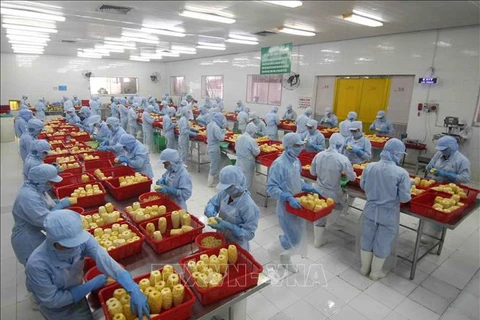 Vietnam's participation in the signing of the RCEP requires a lot of efforts in coordination and consideration of negotiation contents (Photo: VNA)
Vietnam's participation in the signing of the RCEP requires a lot of efforts in coordination and consideration of negotiation contents (Photo: VNA)
Hanoi (VNA) - The Central Institute for Economic Management (CIEM)’s research team has raised proposals on promoting medium- and long-term institutional reform in connection with enhancing the autonomy of Vietnam's economy in order to improve the effectiveness of the implementation of the Regional Comprehensive Economic Partnership (RCEP) agreement.
The deal is expected to come into effect soon and help improve Vietnamese exports’ access to new markets. However, experts are concerned about the benefits Vietnam could gain from the RCEP in the context that the country is running trade deficit with the RCEP area, and suffering negative impacts caused by the disruption of global supply chains caused by the COVID-19 pandemic.
The CIEM, in conjunction with the Australia Supports Economic Reform in Vietnam (Aus4Reform) programme, announced the report “Making RCEP work for economic well-being and autonomy in Vietnam: Required reform of trade and investment institutions" at a workshop on January 20. The function created a chance for participants to discuss measures aimed at improving the effectiveness of the implementation of the agreement and enhance the autonomy of Vietnam's economy in the context of international integration.
According to CIEM Director Tran Thi Hong Minh, the event focused on assessing trade and investment activities between Vietnam and other RCEP members, clarifying institutional and structural issues that may affect the ability to take advantage of the opportunities, and addressing the challenges posed by the deal, thus proposing institutional reforms.
The report raised institutional reform proposals in both medium and long terms in order to improve the effectiveness of the implementation of the RCEP in connection with enhancing the autonomy of Vietnam's economy.
Nguyen Anh Duong, head of the CIEM's General Research Department, said Vietnam's participation in the signing of the RCEP requires a lot of efforts in coordination and consideration of negotiation contents.
In addition to traditional contents such as trade, rules of origin, sanitation and quarantine, and technical barriers, the RCEP agreement also includes newer contents such as e-commerce, competition, and government procurement, Duong said.
For Vietnam's commercial activities, CIEM's report indicates that the RCEP agreement can bring both opportunities and challenges as it creates a free trade area that covers 30 percent of the world's population – a potential market for export.
Analysts said that the RCEP creates a large market of great potential for Vietnamese exports, adding that the country’s imports can also benefit from the agreement.
The deal, at the same time, presents more opportunities for Vietnamese enterprises to participate more deeply in regional production and value chains, and to attract FDI from investment being shifted out of China due to the impact of the US-China trade and technology war.
Participants also underlined the importance of institutional reform in improving the national economy’s autonomy.
Regarding challenges, experts said Vietnam will have to effectively handle the current trade deficit, and take measures to attract more foreign investment from RCEP member countries.
The report provides an approach to effectively implement the RCEP and ensure the national economy’s autonomy with five main groups of solutions.
Accordingly, Vietnam needs to prioritise the promotion of the development of some industries and perfect investment policies in order to attract more investors to the country.
The consistency between trade and investment policies will contribute to helping Vietnam handle more effectively and harmoniously trade deficit and imports of intermediate goods, participants said.
They also suggested that Vietnam should soon remove bottlenecks in infrastructure and human resources, with the participation of foreign investors and partners at an appropriate level.
Reforms must be implemented immediately, instead of waiting for the COVID-19 pandemic to be brought under control, Duong stressed./.

























